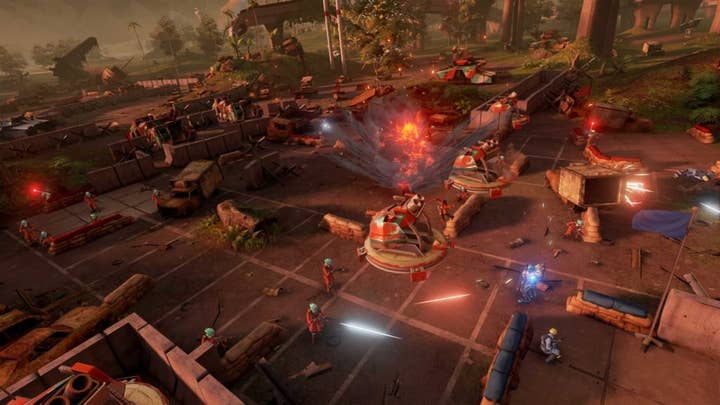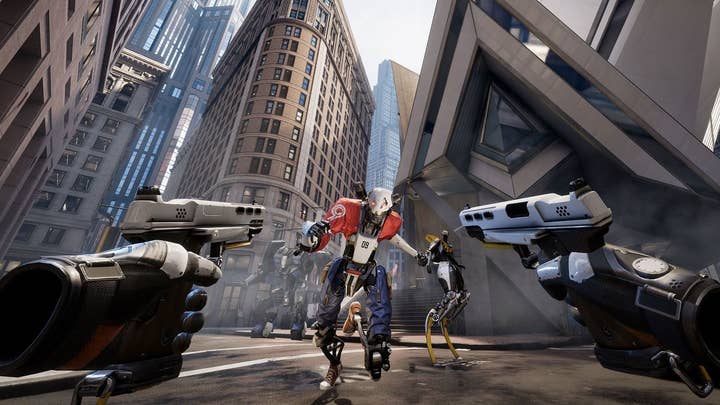Force Field VR: Turning a profit in a difficult market
"Force Field is profitable," says creative director Martin de Ronde, "but at the moment you need to be more a b2b business than a b2c"
Many years ago, Phil Harrison offered Martin de Ronde some advice: "Either be the first, or be the best."
At that time, de Ronde was still commercial director of Guerrilla Games, the studio he co-founded, and he was working with Harrison and Sony on what would eventually become Killzone. Guerrilla was hardly the first developer to work on a console game for PlayStation, but in its laser focus on creating best-in-class technology, Harrison recognised its desire to be the best.
"I never forgot that," de Ronde tells me, though Harrison's advice hasn't always been as simple to act upon as it was to understand. De Ronde left Guerrilla in 2004, shortly before it was acquired outright by Sony, and he went on to establish the Vanguard Entertainment Group in 2010 with Guerrilla co-founder Michael Mol. The idea was to capitalise on the booming market for free-to-play mobile games, but de Ronde admits they were "three or four years behind" the opportunity.
"With mobile we were too late," he says. "With VR we didn't want to be too late."
"It was a leap of faith... but a leap of faith based on an opportunity that only comes once every five or ten years"
Force Field VR was initially founded as a separate company to Vanguard in late 2014, a time when "the hype meter was off the scale" for the potential of VR. Offers to work on "showcase content" for Oculus Rift and Microsoft's HoloLens soon followed, and it eventually became clear that a rare opportunity was there for the taking; to be not just the first, but among the very best as well.
"If we want to be good at this we have to specialise in it, and not get distracted by more traditional games," de Ronde says, referring to the decision to merge Vanguard with Force Field and focus on VR. "It was a leap of faith, because we didn't know what the market would be like. But a leap of faith based on an opportunity that only comes once every five or ten years."
The merger left Force Field VR with a team of 30 people; at the time of our conversation that team had grown to more than 80, and the business was turning a profit. Force Field has accomplished this in a VR market that - many observers will tell you - has largely failed to materialise and can barely sustain even small indie studios. However, while de Ronde acknowledges that conditions remain tough, finding stability is really just a matter of focus.
Force Field has developed several games - including Landfall for Oculus Rift and Term1nal for Gear VR - but it is also working with augmented reality, holographic, location-based experiences, and taking corporate work for major brands. De Ronde and his co-founders didn't stumble into this strategy by accident, a reluctant Plan B when the Plan A of making VR first-person shooters didn't pay off. According to de Ronde, betting everything on games was never part of the plan.

"The agency model was on the table as soon as we started talking about the potential of VR," he says. "Force Field is a profitable business, but at the moment you need to be more a b2b business than a b2c."
There are some games that have sold up to 100,000 units, de Ronde says, but the fact is that, in the current market for consumer VR, "if you sell 1,000 copies of your game, that can sometimes be seen as a success." In that environment, it is very difficult to sustain a company through games alone, and that is only likely to change through a commitment to lowering the price of entry on the part of the hardware manufacturers. Happily, both Oculus and HTC seem prepared to do just that, though it's still hard to predict when a strong consumer games market will emerge.
"You need to be agile, flexible, and light on your feet; look at all of these different avenues and see how they turn out"
"Crystal-ball gazing is very much the fashion in the VR market these days, and the ridiculously poor reports from analysts sometimes are not helping," de Ronde says. "For us, looking at what the uptake is on the devices based on the numbers we can more or less get access to, we think 2018 and beyond is when you will start to see a market that's more than healthy enough to sustain individual, independent developer investments into VR."
Until that happens, Force Field is likely to remain "very much a business-to-business company" in terms of the sources of its revenue. "Brands are coming in, and larger organisations like theme parks, where there is meaningful revenue to be found," de Ronde adds. "Hardware manufacturers on the headset side, but also hardware manufacturers that may be on the periphery of the VR market is also where money can come from."
Force Field also has a "substantial" interest in location-based experiences, though the fact that de Ronde identifies the risk that, in the long-term, VR centres may face the same challenge as arcades in the aftermath of PlayStation speaks to how fickle the VR business will remain in the coming years.
"The last thing we want to do is create a situation where you have the Ridge Racer implosion. The moment I got my PlayStation and played Ridge Racer is the moment I stopped going to arcades, and I think if prices keep on coming down on headsets, it's going to be very advantageous for the market, but VR centres will start to lose their relevance to a certain degree.
"You just need to be agile, flexible, and light on your feet; look at all of these different avenues and see how they turn out."
"Facebook is investing in high quality content that people who buy expensive headsets fully deserve"
Force Field's most ambitious game to date is Landfall, an action-strategy title with the kind of polish one now associates with Oculus Rift exclusives. Of course, platform exclusives have proved divisive within the VR community, with HTC going so far as to suggest that Oculus' decision to bankroll projects in exchange for (mostly timed) exclusivity could harm the evolution of the market.
However, while de Ronde understands the frustration some consumers might have at not being able to access certain games, he spots obvious flaws in the notion that exclusive content could hurt the way the market develops. Whether for PlayStation, Xbox or Nintendo, some of gaming's best and most progressive IPs exist because of the funding and freedom that an exclusive deal can offer.

"There's something about big companies competing with each other," he says. "Driving the price of the hardware down, and investing a lot of money into exclusive content that really needs to be cutting-edge in order to defeat the other hardware empire - that has yielded a lot of really interesting titles.
"Whether you're a Daydream user or an Oculus user or a Vive user, you should actually be happy with [Mark Zuckerberg] going onstage and saying they're going to further spend $250 million on the ecosystem. The ecosystem will start at their end because it's their money being ploughed into it; they want VR at large to be successful, but they also need their devices to be successful.
"There's a lot of cool indie stuff out there, but it's small. We run the risk that people will start to perceive VR as a platform for demos"
"What Jason Rubin and his team have done over the last few years is, in my mind, exactly the right thing to do. You can either do that, or you can wait for the community itself to slowly start building experiences that are two hours instead of one hour, which slightly increases the market so next year they can build three hour experiences instead of two hour experiences.
"What Facebook is doing is investing in high quality content that people who buy [expensive] headsets fully deserve."
Even beyond what consumers deserve, de Ronde recognises a "risk" involved in letting the market grow too slowly. With games like Landfall, Superhot VR, Robo Recall, Lone Echo, Wilson's Heart and a host of others, Oculus has provided the market with a clear alternative to the smaller, less polished experiences that are so abundant on the marketplace. The money invested by Facebook is simply a "shortcut" to the kind of diversity that might only exist in five years otherwise, an amount of time that could be damaging to the VR market's long-term prosperity.
"There's so much potential in VR, but there's a quite a few ways we can fuck it up," says de Ronde, who applies that assessment to both the business and creative side of VR. "If you have a lot of single mechanic, ten-minute demos coming out - no disrespect, because there are lots of great indie developers, but they don't have the means to turn them into six or seven hour experiences. You can almost sense consumers screaming out for more."
In that respect, the most pressing issue may not be that Oculus is funding exclusives, but that Oculus is one of the few companies putting significant funding behind individual VR games at all. The number of traditional games supporting VR modes is increasing - Resident Evil 7 being the obvious example, but Rockstar has reached into its back-catalogue to create a new version of L.A. Noire - but even now the only major third-party publishers to really throw their weight behind VR games are Ubisoft and Bethesda. Facebook has been generous as the parent company of Oculus, but it can't fund the ecosystem forever.
"We definitely need to see more third-party publishers in the market," de Ronde agrees. "We are fully convinced that we need to build the ecosystem through stellar experiences now... People have bought what is a fairly expensive piece of hardware, and they deserve to be served high quality content that is similar to content they see [on console and PC].
"We need more people entering at a range of different budgets, and not just cool indie stuff. There's a lot of cool indie stuff out there, but it's all small. We run the risk that people will start to perceive VR as a platform for demos."
